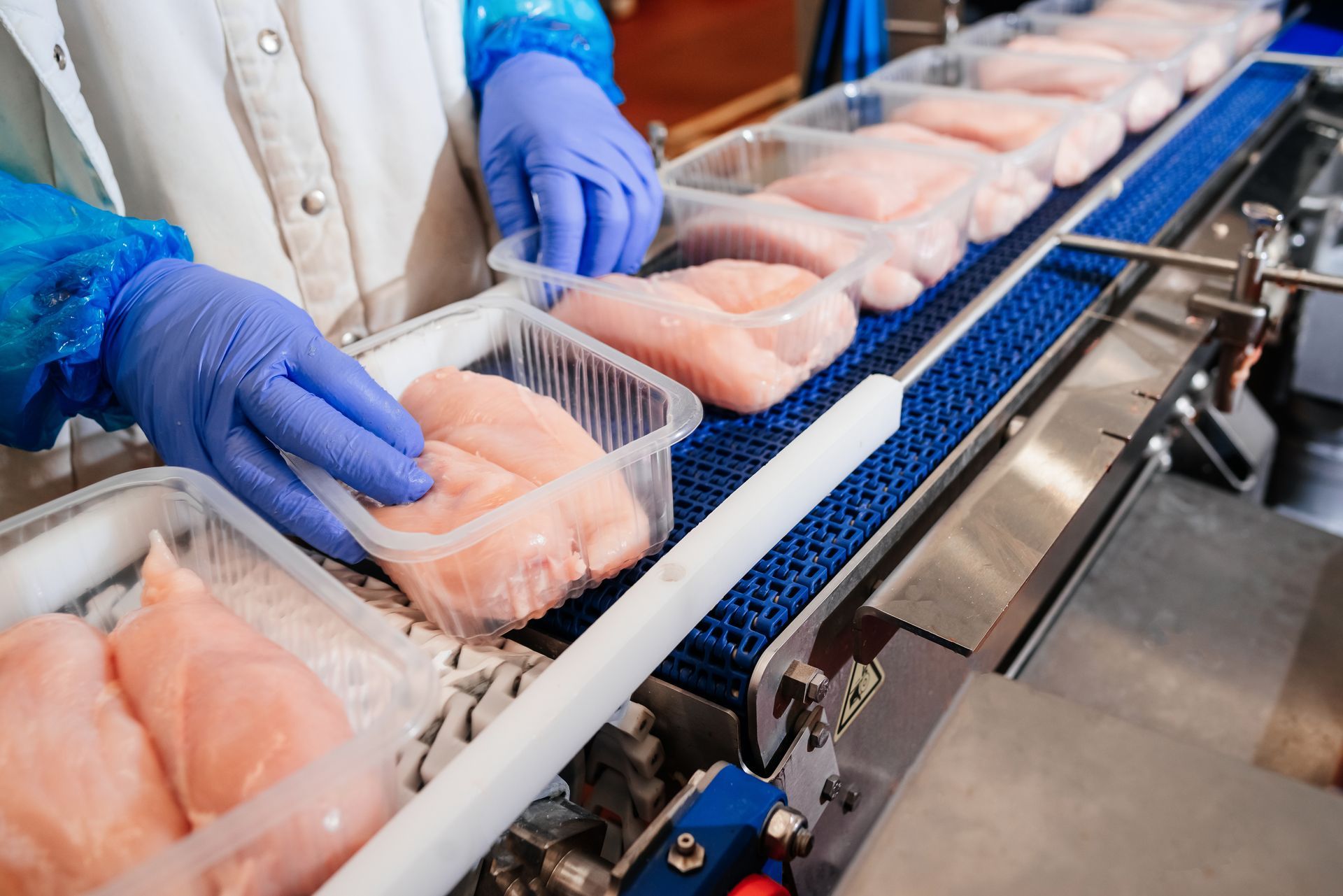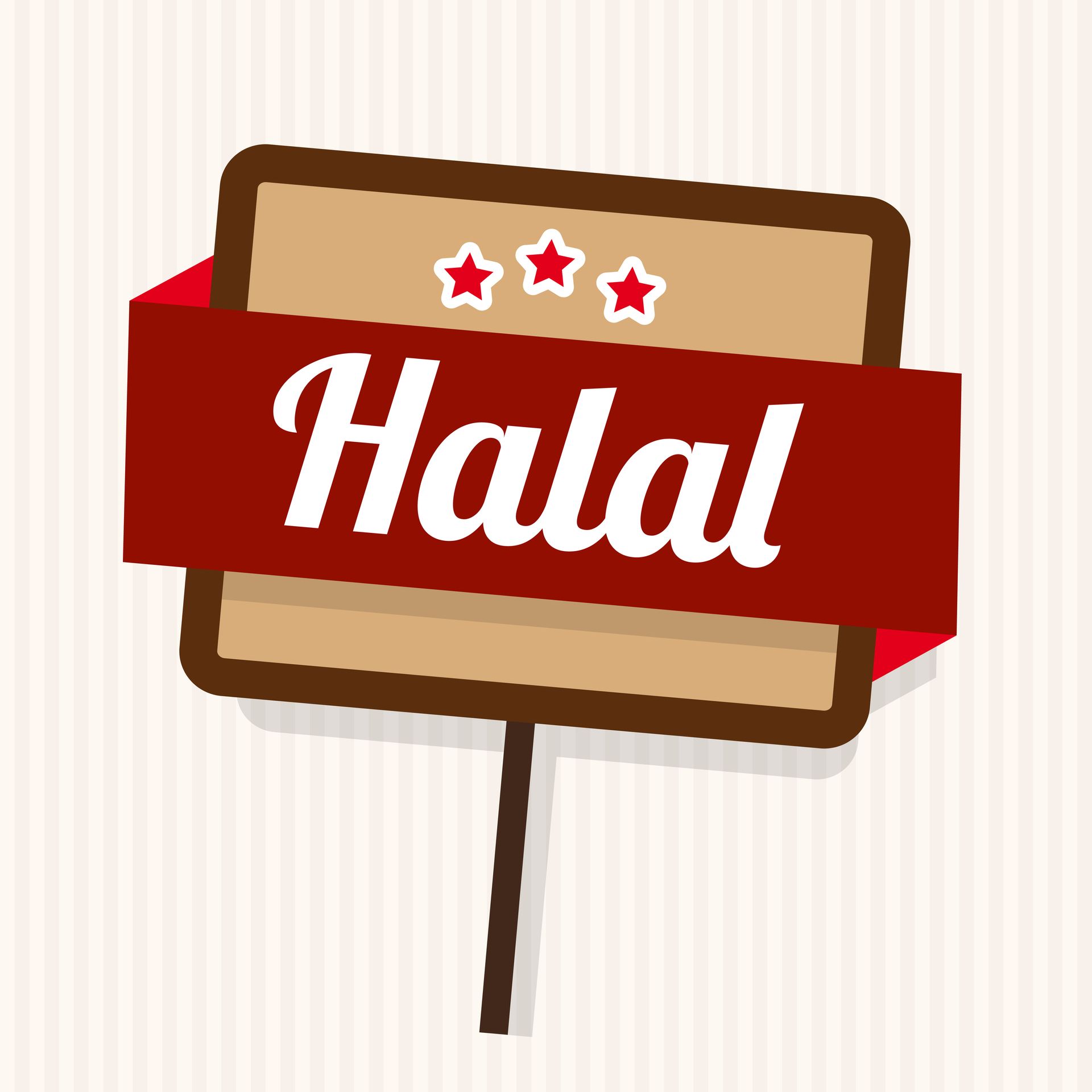1-877-HALAL-WW (+1-877-425-2599)
Truth: “Machine Slaughtering” is ACTUALLY Halal
Rebutting the naysayers, and setting the record straight regarding mechanical aid in processing Halal poultry

In America, there is a going narrative that warns Muslims and halal-conscious consumers to be warry of something called “Machine Slaughtering”. It screams of a vacuous process, mindless machines aimlessly walking about chopping off the heads of chickens at random. “Bismillah Allahu Akbar” plays on repeat over loud speaker, reminiscent of a bad 1950’s sci-fi classic. A method so sinister that you, as a person who cares about what they consume shouldn’t dare go near with a 10-foot pole. Imams and Muftis alike flash warning signs so bright that the general constituents ask “Is the beef hand slaughtered or machine slaughtered?”, a question so erroneously based that I wonder if it should be taken seriously at all (there is no such thing as machine slaughtering for cows).
It’s gotten so bad that here in America we have a growing sentiment, that halal in some ways has lost its prestige. Nowadays, you would be remise to label your meat as halal alone. No sir. The product must be “Zabiha halal” or else we “shouldn’t eat it”, “it’s fake halal”, “not genuinely pious”.
We’ve heard it all, and we’ve had enough. It is time that the truth of the matter be addressed head on, and the misconceptions corrected. As a representative of the Halal certification industry, I am burdened with the task of not only deeply investigating companies that make products for the halal conscious consumer, but also learning and teaching. It is our duty to be knowledgeable, studied, well informed, and have a deep understanding scripture, as well as those matters that our society faces. This is why today, we will be tackling the topic of “Machine Slaughtering” to finally descope the issue for Muslim Americans, and others beyond.
Difference of Opinion: Ikhtilaaf
First, it is important to note that in this matter there is ikhtilaaf (difference of opinion amongst the jurists), as is the case with nearly all contemporary matters. Typically, this also means that there will be a majority view and a minority view. The majority of Islamic jurists, or schools of thought (maddhab) may opine one way or the other, and depending upon the context in which we live, one opinion may be better suited than the other. Therefore, this is an exercise to prove to the laymen that not only is mechanical aided slaughtering permissible, but in the modern context, afdhal (more preferred).
Officially, three main opinions are by jurists the world over in relation to this matter. They are as follows:
1. (Majority View) The slaughter of an animal with mechanical aid is permissible, so long as all of the conditions for slaughter are met.
2. (Minority View) The slaughter of an animal with mechanical aid is permissible, but only the first animal slaughtered fulfills the conditions, and no subsequent animals fulfill the conditions
3. (Minority View) The slaughter of an animal with mechanical aid does not fulfill all conditions, therefore, is not permissible.
In light of the fact that the matter is contemporary (meaning, no examples exist in Islamic history), and that no ijma’ (consensus) exists amongst the scholars, we should take a measured approach and NOT disrespect any other opinions or viewpoints. The correct answer will always lay with Allah SWT all mighty, and we as his wakeel (agents) on this earth are struggling to find the correct answer. If the derived conclusion is right by Allah SWT, then we are rewarded doubly. Yet, if proper ijtihad (scholarly study and struggle) is applied in a sincere way, yet the individual scholar still does not derive the correct answer in the eyes of Allah SWT, then there is still one reward. No proper scholar would ever berate, tarnish, smear, or attack another scholar for their opinion which has both sound and valid justifications. We do not believe this approach is Islamic, nor wise, and it only creates unnecessary infighting, marring the halal industry. This is wrong by Allah, and anyone who espouses this behavior must refrain from doing so.
The conditions of the Islamic method of slaughter
Regardless of the slaughter method position one holds, the primary question to solve for is the prerequisites for the Islamic method of slaughter. If the conditions are fulfilled, then the slaughter is considered halal. If the conditions are not fulfilled, then the slaughter is deemed Haram. So, what are the conditions of the Islamic method of slaughter?
1. Slaughterer must be a Muslim, or a professed Jew or Christian
2. Intention must be present for the specific slaughtering tool and animal
3. Animal must be alive
4. The tasmiyyah (Slaughtering in the name of Allah) must be mentioned
5. Severing at least 2 of the 4 ventricles (Trachea and Esophagus)[1]
6. If the slaughterer is a Jew or a Christian, all conditions including mentioning the tasmiyyah apply.
Although it is permissible to have a Jew or a Christian perform the slaughter, abattoirs hire Muslims to perform the process of slaughter due to the knowledge, experience, and added level of scrutiny for those products. For a Kitabi to perform the halal slaughter, a rigorous vetting process must be undertaken to determine a number of factors, such as the history of their belief, their trust worthiness, and many others. Additionally, some schools of thought only allow a Jew or Christian to slaughter for halal if they are able to trace their lineage back to their prophet, which is practically impossible. To help simplify things, a Muslim slaughterman is the easiest choice for halal process.
The "Machine Slaughter" Process
So, how does it work?
1. A Muslim slaughterman stands at the activation panel of the mechanical tool
2. He or she makes their intention to slaughter a batch of birds with the mechanical device
3. Once the intention is established, the tasmiyyah is verbalized
4. If at least 2 of the 4 ventricles are not severed, a secondary slaughterman stands nearby the cutter to manually perform the slaughter, fulfilling all of the necessary conditions. This individual becomes the primary slaughter person, therefore, he must still fulfill all of the prior stated conditions.
As can be seen, the machine slaughter process does fulfill all of the conditions of the dhabh, or halal slaughter procedure.
Misunderstandings: “Machine Slaughtering”
The term “Machine slaughtering” is a misnomer, and suggests that a machine performs the slaughtering procedure. This purports that the first and second conditions of being a kitabi (human), and having a proper intention, cannot be fulfilled. If this were an accurate depiction of the process, no Muslim would ever say that it is permissible to consume this type of meat. There would be no difference of opinion here, just like there is no difference of opinion that it would be impermissible to consume a cow that was killed by a coyote, , or eating a small goat killed by an eagle. The prey of these animals would be considered maytah, or dead meat, which is not only impermissible to consume, but is also Najis, or filthy.
We find corroboration in the following Qur’anic verse:
“Forbidden to you are carrion, blood, and swine; what is slaughtered in the name of any other than Allah; what is killed by strangling, beating, a fall, or by being gored to death; what is partly eaten by a predator unless you slaughter it; and what is sacrificed on altars.” Maida - 5:3
This understanding would also lead to an errant conclusion regarding any individual who slaughters with a knife. We would have to conclude that the individual holding the blade did not perform the slaughter, but rather, it was the knife itself that did, an in animate, non biological thing can't host any intention to begin with. Rather, we don't think like this. We consider the knife as a tool, and the wielder as the slaughterer, even if the knife is thrown to its target as a hunter does. In the same way, the machine is merely the tool of the slaughterer, and not the one actually performing anything.
The Tools of Slaughter: Permitted Means
Some suggest that holding a knife for slaughter is the only permissible method of slaughter. This, however, couldn’t be further from the truth, as we see in our Islamic history a number of different permitted means of slaughter:
1. Slaughter (dhabh) by projectile (mi’rad)
“I asked Allah's Messenger (ﷺ) about the Mi'rad (a heavy featherless blunt spear). He said, “If you hit the game with its sharp edge, eat it, but if the Mi'rad hits the game with its shaft with a hit by its broad side do not eat it, for it has been beaten to death with a piece of wood. (i.e. unlawful).” [2]
The Messenger of Allah (ﷺ) said to me: Abu Tha'labah, eat what returns to you by your bow…[3]
2. Slaughter (dhabh) with any sharp object
It was narrated by Adi ibn Hatim: “I asked: ‘Messenger of Allah, tell me when one of us catches game and has no knife; may he slaughter with a flint and a splinter of stick?’ He said: ‘Cause the blood to flow with whatever you like and mention Allah's name.’ [4]
It was narrated by Ka`b bin Malik: A lady slaughtered a sheep with a stone and then the Prophet (ﷺ) was asked about it and he permitted it to be eaten. [5]
3. Slaughter (dhabh) with hunting animal
It was narrated from 'Adiyy bin Hatim that he asked the Messenger of Allah about hunting and he said: “If you release your dog, then, other dogs, whereby you have not mentioned the name of Allah, join him, then do not eat, because you do not know which of them killed it (the game).” [6]
As is apparent, many other means of slaughter have been approved in Islamic history as permissible.
It is extremely important to make note of the fact that the prophet SAWS did not permit the consumption of the animal if it was caught by an unintended hunting animal. This informs us that intention is an integral part of the slaughtering process. Human intention is paramount in order to classify the killing of an animal as dhabh (islamically slaughtered). Without human intention, the dhabh has not taken place.
Thus, herein lay the most important factor thatturns the empty process of “machine slaughtering” into “mechanically aided” slaughter. When the slaughterman begins the process of starting the machine for the purpose of slaughtering a number of poultry, he must first begin with a proper niyyah (intention). Without a proper intention, the entire slaughter would not be considered halal. This would apply even to such a degree that if the slaughterman intended to press the button to start the machine for halal slaughter, but he forgot, and someone else pressed the button without the proper intention, or a satanist (non-ahlul kitab, or person of the book, i.e, Jew/Christian) pressed the button, the entire flock would be disregarded as dead-meat.
Counter Arguments: Tasmiyyah
Some of those who disregard slaughtering with mechanical aid do not contend with the machine as a tool, but rather, contend with the mentioning of the tasmiyyah (blessing) over each individual animal as being impossible, as it must be performed by the one who slaughters.
We disagree with this understanding entirely, and it is shown textually that not only is it possible, but some of the presupposed elements of the argument are not in fact to be presumed.
The tasmiyyah, according to the majority view, is an integral part of the slaughtering procedure. Only the Shafi’I maddhab opines differently to this point, whereby they state that this is not a rukn (pillar) of the slaughtering procedure. We have written in our research paper “HWW Certification Methodology & Standards Analysis 2023” as to why we agree with the majority view on this point, however, if one did not agree, there would be no additional reason to disagree with the position that slaughtering with mechanical aid is permissible, full stop.
Be that as it may, our opinion is that it is a necessary integral to the dhabh process:
“And for all religions We have appointed a rite [of sacrifice] that they may mention the name of Allah over what He has provided for them of [sacrificial] animals. For your god is one God, so to Him submit. And, [O Muhammad], give good tidings to the humble [before their Lord]” [7]
The Prophet (ﷺ) said: “Whatever causes blood to flow, and Allah's Name has been mentioned over it, then eat it” [8]
The argument thus carries forward; can this be fulfilled properly by the one who starts the mechanical process? If a slaughterman mentions the words “Bismillah” (In the name of God, meaning, I perform this slaughter in Gods name only), then this condition has been fulfilled. The counter claimant argues however that it has not been mentioned upon each individual animal, to which point we rebut with the following.
First, Allah and his Rasul do not say “If you have two, or more, mention the name of Allah multiple times”. This is not found anywhere in the Qur’an, nor in any prophetic tradition. For one to restrict a divine clause that has been left unrestricted is not proper from a scholarly perspective, without evidence to restrict it. We find, however, evidentiary proof that support that this act is naturally, and canonically unrestricted. In other words, the tasmiyyah it may be mentioned once, without being repeated.
Narrated Anas: The Prophet (ﷺ) offered as sacrifices, two double horned rams, black and white in color. He slaughtered them with his own hands and mentioned Allah's Name and said “Takbir” and put his foot on their sides.[9]
If we dissect the hadith in Arabic, it mentions بِكَبْشَيْنِ أَمْلَحَيْنِ أَقْرَنَيْنِ (Two white dual horned rams with a black head), all using the dual form of the word ين. Then he says, ذَبَحَهُمَا بِيَدِهِ (He slaughtered them two (dual) of them with his hand (singlular). وَسَمَّى وَكَبَّرَ (He said Gods name, (bismillah, singular form), and said “God is great” (Allahu Akbar, singular form as well). Nothing in the text indicates it was mentioned more than once, or that it should be mentioned more than once per session. Additionally, this hadith is found in various other tradition books with slightly different wording, and never is there any indication that the name of Allah was mentioned twice.
Counter Arguments: Intention
Some argue “an intention may not be translated over multiple animals at the same time”. Textually, this is not an accurate clause. In our Islamic history, we have many examples of an intention translating over to multiple items, and in some cases, even if the additional items are unknown. This is captured in the Research report our team publishes with updated information on an annual basis, and we will quote it here:
The Fetus Inside of the Mother
“The Prophet (ﷺ) said: “Slaughtering the fetus is (achieved by) the slaughtering of its mother.” [10] In this instance, the Prophet (ﷺ) demonstrates that proper slaughtering of the mother suffices for the fetus as well. The termination of life cascades and the original means of death carries over collaterally. Thus, the original tasmiyyah suffices. This hadith is a strong textual support for the permission of utilizing mechanical tools whose function causes a series of consecutive and consequent deaths. It is also clear that the tasmiyyah is not mentioned twice for the permissibility of the fetus inside of the mother. In fact, in many cases, both contemporarily, and historically, the fetus was not known to exists, therefor, not intended to be slaughtered.
Here, it is argued that the illa (operative cause or reason) for this ruling is that the tool of slaughter that the slaughterer intended to utilize, along with the mention of the tasmiyyah, remained the same, thus, it carries the tasmiyyah over to any subsequent animal. So long as the proper conditions are adhered to at the time of commencing the slaughter, the tasmiyyah suffices for the sequential slaughter that follows.”
[…]
“The One Suffering From Incontinence or Chronic Bleeding
We also find similar rulings in the matter of the Muslim who suffers from incontinence, or the female who suffers from istihaadah (chronic bleeding). One experiencing such is permitted to join two salawaat upon the presence of a single wudu. This is unique because the chronic bleeder, or the person who suffers from incontinence normally must perform a ghaslan (washing) prior to each [individual] prayer. The Prophet ﷺ however, granted permission to the one experiencing chronic bleeding to bring their prayers forward (thuhr with asr, and Magrib with Isha) close to the end of each waqt (time period) and perform both prayers within their consecutive timeframes. Clearly, it is demonstrated from this case that a single action may suffice for multiple consequent actions that follow.”
[…]
“Intention for Ramadhan – Imam Malik
In the Maliki school of thought, the Muslim is permitted to fast all 30 days upon a single intention from the first night, so long as his intention is to fast for the entire month of Ramadhan. This is also reported as a position of Imam Ahmad in his book of fiqh.[11] This opinion is valid, despite the existence of the hadith where the Prophet is reported to have said “Whoever does not form his intention to fast before to fajr, his fasting will not be accepted.”[12]. In this matter pertaining to machines being used as a tool for slaughter, no prohibitive, or restrictive text exist that prevents one from mentioning the tasmiyyah with the intention of slaughtering more than one animal.”
Scholarly Viewpoints
The following juridic councils provide these official position-based publishing’s:
ASSEMBLY OF MUSLIM JURISTS OF AMERICA (AMJA)
AMJA officially states in there The Fiqh of Mechanical Slaughter research document the following:
“If a Muslim or true follower of a divine scripture turned the machine on after pronouncing Bismillah and the mechanical blade cut the throat of an animal or chicken then the chicken will be considered Halal because all the required conditions were fulfilled in this method of slaughter. Another issue with mechanical slaughter is that once the slaughterer is determined then it is also necessary to pronounce Bismillah upon each animal being slaughtered. If someone pronounced Bismillah before turning the machine on but did not specify the chickens that are going to be slaughtered then the chickens will not become Halal.”
THE ISLAMIC FIQH ACADEMY OF JEDDAH
IFAJ has adopted the same opinion with regard to mechanical slaughter. It is said in the final decision of 10th seminar of Islamic Fiqh Academy Jeddah: “The ideal method of slaughtering is that the chickens should be slaughtered by hand but if the slaughtering is performed by machine, then there is no harm in it provided that the conditions of Islamic slaughter are being fulfilled and reciting Bismillah once will be sufficient for each flock of the birds. If the process is interrupted then Tasmiya will be repeated.”[13]
ISLAMIC FIQH ACADEMY OF INDIA
A large contingent of well qualified and respected Ulama in relation to mechanical slaughter believed as follows:
If the machine is turned on by a Muslim or a practicing Jew or Christian after pronouncing the name of Allah then all the chickens slaughtered in this manner will be considered Halal as long as the machine continues to operate without any interruption. This opinion was held by the founder and president of Islamic Fiqh Academy India Maulana Mujahidul Islam Qasmim, Maulana Jalaluddin Anser Umri, Maulana Khalid Saifullah Rehmani, Maulana Raisul Ahrar Nadawi and many more. According to the opinion of these scholars, the continuous operation of the machine is one action and if the machine is turned off and then turned on again is another action. Therefore, according to the opinion of these scholars, if the machine is turned on after reciting the name of Allah then all the chickens that will be slaughtered one after the other will be considered Halal. If the machine is turned off then same procedure should be repeated for turning it on again.”
SHAYKH MUHAMMAD TAQI AL-‘UTHMAANI, A LEADING WORLD RENOWNED HANAFI JURIST STATES:
“Saying “Bismillah” over machines, which is drawing an analogy between turning on the machine and releasing a hunting dog. It is not obligatory to say “Bismillah” when the prey animal dies; rather it must be said when releasing the dog, and there may be a lengthy interval between the release of the dog and the death of the prey, and the hunting dog may kill a number of animals after being released once. So, it seems that saying “Bismillah” once is sufficient for all of them to be regarded as halal. Ibn Qudaamah (may Allah have mercy on him) said: If the hunter says “Bismillah” over one prey (when releasing his dog) but then he catches another, it is halaal, and if he says “Bismillah” over one arrow and shoots it, then he takes another and shoots it (without saying “Bismillah”), what he catches with it (the second arrow) is not halaal.
What we mentioned above has to do with necessity, and in the issue under discussion, there is no necessity. However, if we think of the need to produce a large amount within a short time, which is because of increased population and the rise in the number of consumers, and the small number of Slaughtermen, and the fact that sharee‘ah waived the condition of specifying the prey in the case of hunting because it is too difficult, as Ibn Qudaamah (may Allah have mercy on him) said, and in such cases sharee‘ah allows concessions to ward off hardship, in that case we may compare the issue under discussion to the issue of necessity (as in the case of hunting) with regard to mentioning the name of Allah, so as to ward off hardship and make things easier for people. [14]
Shaykh Uthman presents an argument based upon the text which is sound and reasonable. Even if other competing views exist, here is an example that shows mechanical aid in the slaughtering process to be permissible.
HALAL WATCH WORLD’S POSITION (A US Based Halal Certification Agency)
[…]Thus, if a slaughterman mentions the tasmiyyah before starting a mechanical device used as a tool which necessarily fulfills the conditions of the ritual slaughter, then any subsequent animal killed as a result of the initial intention and tasmiyyah is Halal, and the tasmiyyah is not twice nor more required. This action carries over only to the extent of the session, and those animals which were intended under that particular tasmiyyah and intention. As the earlier text indicated, the permission is tied to the consequent and collateral actions thereof. Thus, we consider the customary term “per batch” as easily definable and accepted before a new intention must be re-instated.”
Conclusion:
It is unequivocally clear from the information provided that the majority of scholars view mechanical aid in the slaughter process as being permissible. This is supported canonically from an Islamic perspective, and the opposing view is seen as extreme for various reasons.
Additionally, it is inappropriate to call it "Machine Slaughtering", as it suggests that machines perform slaughter, to which one would ask, "Do knives slaughter?". The mechanical aid in the slaughter process should be seen as an extension of the knife, no different. In this way, it is more sensibly viewed as a tool, just like a spear, knife, or other sharp cutting tools.
We do not endorse berating or attacking others for their views. Other organizations and groups are free to provide their own perspective, however, there is no doubt that no one can question one who consumes poultry that is slaughtered with mechanical aid. No one should argue, or hate the other side, since the opinion has a strong textual basis, and happens to be the majority view. We are blessed to have such an accommodating and practical religion.
I pray that Allah SWT help all of our communities to remain connected, and that we be a positive force for good within it.
Ameen!
[1] Umdat As Salik – 364 j17.4 : “The necessary condition for slaughtering any animal which is within one’s capacity to slaughter is to cut both the windpipe and the gullet (Trachea and Esophagus). It is not necessary for the validity of slaughtering to cut the carotid arteries, which are two blood vessels on the sides of the neck encompassing the windpipe.” This position differs
[2] حَدَّثَنَا سُلَيْمَانُ بْنُ حَرْبٍ، حَدَّثَنَا شُعْبَةُ، عَنْ عَبْدِ اللَّهِ بْنِ أَبِي السَّفَرِ، عَنِ الشَّعْبِيِّ، قَالَ سَمِعْتُ عَدِيَّ بْنَ حَاتِمٍ ـ رضى الله عنه ـ قَالَ سَأَلْتُ رَسُولَ اللَّهِ صلى الله عليه وسلم عَنِ الْمِعْرَاضِ فَقَالَ " إِذَا أَصَبْتَ بِحَدِّهِ فَكُلْ، فَإِذَا أَصَابَ بِعَرْضِهِ فَقَتَلَ فَإِنَّهُ وَقِيذٌ، فَلاَ تَأْكُلْ ". فَقُلْتُ أُرْسِلُ كَلْبِي. قَالَ " إِذَا أَرْسَلْتَ كَلْبَكَ وَسَمَّيْتَ، فَكُلْ ". قُلْتُ فَإِنْ أَكَلَ قَالَ " فَلاَ تَأْكُلْ، فَإِنَّهُ لَمْ يُمْسِكْ عَلَيْكَ، إِنَّمَا أَمْسَكَ عَلَى نَفْسِهِ ". قُلْتُ أُرْسِلُ كَلْبِي فَأَجِدُ مَعَهُ كَلْبًا آخَرَ. قَالَ " لاَ تَأْكُلْ، فَإِنَّكَ إِنَّمَا سَمَّيْتَ عَلَى كَلْبِكَ، وَلَمْ تُسَمِّ عَلَى آخَرَ ". - Reference: Sahih al-Bukhari 5476
[3] Sunan Abi Dawud 2856
[4] حَدَّثَنَا مُوسَى بْنُ إِسْمَاعِيلَ، حَدَّثَنَا حَمَّادٌ، عَنْ سِمَاكِ بْنِ حَرْبٍ، عَنْ مُرِّيِّ بْنِ قَطَرِيٍّ، عَنْ عَدِيِّ بْنِ حَاتِمٍ، قَالَ قُلْتُ يَا رَسُولَ اللَّهِ أَرَأَيْتَ إِنْ أَحَدُنَا أَصَابَ صَيْدًا وَلَيْسَ مَعَهُ سِكِّينٌ أَيَذْبَحُ بِالْمَرْوَةِ وَشِقَّةِ الْعَصَا فَقَالَ " أَمْرِرِ الدَّمَ بِمَا شِئْتَ وَاذْكُرِ اسْمَ اللَّهِ عَزَّ وَجَلَّ " . - Grade: Sahih (Al-Albani) صحيح (الألباني) حكم: - Reference: Sunan Abi Dawud 2824
[5] حَدَّثَنَا صَدَقَةُ، أَخْبَرَنَا عَبْدَةُ، عَنْ عُبَيْدِ اللَّهِ، عَنْ نَافِعٍ، عَنِ ابْنٍ لِكَعْبِ بْنِ مَالِكٍ، عَنْ أَبِيهِ، أَنَّ امْرَأَةً، ذَبَحَتْ شَاةً بِحَجَرٍ، فَسُئِلَ النَّبِيُّ صلى الله عليه وسلم عَنْ ذَلِكَ، فَأَمَرَ بِأَكْلِهَا. وَقَالَ اللَّيْثُ حَدَّثَنَا نَافِعٌ أَنَّهُ سَمِعَ رَجُلاً مِنَ الأَنْصَارِ يُخْبِرُ عَبْدَ اللَّهِ عَنِ النَّبِيِّ صلى الله عليه وسلم أَنَّ جَارِيَةً لِكَعْبٍ بِهَذَا. - Sahih al-Bukhari 5504
[6] Grade: Sahih (Darussalam) - Reference: Sunan an-Nasa'i 4268
[7] (22:34) - وَلِكُلِّ أُمَّةٍ جَعَلْنَا مَنسَكًا لِّيَذْكُرُوا۟ ٱسْمَ ٱللَّهِ عَلَىٰ مَا رَزَقَهُم مِّنۢ بَهِيمَةِ ٱلْأَنْعَٰمِ ۗ فَإِلَٰهُكُمْ إِلَٰهٌ وَٰحِدٌ فَلَهُۥٓ أَسْلِمُوا۟ ۗ وَبَشِّرِ ٱلْمُخْبِتِينَ
[8] Grade: Sahih Jami` at-Tirmidhi 1491
[9] حَدَّثَنَا قُتَيْبَةُ، حَدَّثَنَا أَبُو عَوَانَةَ، عَنْ قَتَادَةَ، عَنْ أَنَسٍ، قَالَ ضَحَّى النَّبِيُّ صلى الله عليه وسلم بِكَبْشَيْنِ أَمْلَحَيْنِ أَقْرَنَيْنِ، ذَبَحَهُمَا بِيَدِهِ، وَسَمَّى وَكَبَّرَ وَوَضَعَ رِجْلَهُ عَلَى صِفَاحِهِمَا. - Sahih al-Bukhari 5565
[10] حَدَّثَنَا مُحَمَّدُ بْنُ بَشَّارٍ، حَدَّثَنَا يَحْيَى بْنُ سَعِيدٍ، عَنْ مُجَالِدٍ، ح قَالَ وَحَدَّثَنَا سُفْيَانُ بْنُ وَكِيعٍ، حَدَّثَنَا حَفْصُ بْنُ غِيَاثٍ، عَنْ مُجَالِدٍ، عَنْ أَبِي الْوَدَّاكِ، عَنْ أَبِي سَعِيدٍ، عَنِ النَّبِيِّ صلى الله عليه وسلم قَالَ " ذَكَاةُ الْجَنِينِ ذَكَاةُ أُمِّهِ " . قَالَ وَفِي الْبَابِ عَنْ جَابِرٍ وَأَبِي أُمَامَةَ وَأَبِي الدَّرْدَاءِ وَأَبِي هُرَيْرَةَ . قَالَ أَبُو عِيسَى هَذَا حَدِيثٌ حَسَنٌ صَحِيحٌ وَقَدْ رُوِيَ مِنْ غَيْرِ هَذَا الْوَجْهِ عَنْ أَبِي سَعِيدٍ . وَالْعَمَلُ عَلَى هَذَا عِنْدَ أَهْلِ الْعِلْمِ مِنْ أَصْحَابِ النَّبِيِّ صلى الله عليه وسلم وَغَيْرِهِمْ وَهُوَ قَوْلُ سُفْيَانَ الثَّوْرِيِّ وَابْنِ الْمُبَارَكِ وَالشَّافِعِيِّ وَأَحْمَدَ وَإِسْحَاقَ . وَأَبُو الْوَدَّاكِ اسْمُهُ جَبْرُ بْنُ نَوْفٍ - Grade: Sahih - Jami` at-Tirmidhi 1476
[11] Mo`jam al Fiqh al Hanbali, 1973, vol. 2, p. 623, and Kitabul Fiqh alal Madhabib al arba’ah, p. 430.
[12] Bulug Al Marram: Book 5, Hadith 677
[13] (Qararat Majmaul Fiqhil Islami, page:224)
[14] Majallat Majma‘ al-Fiqh al-Islami, issue no. 10, vol. 1, p. 541-544









